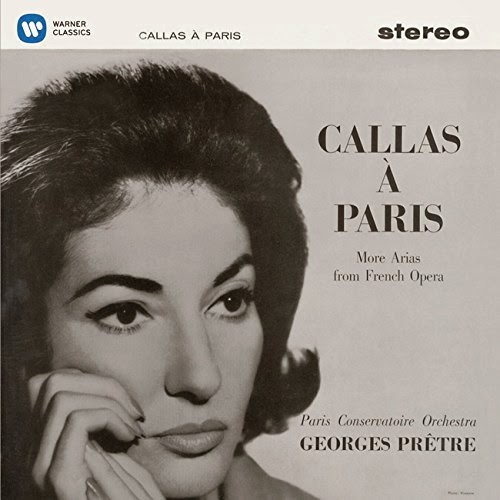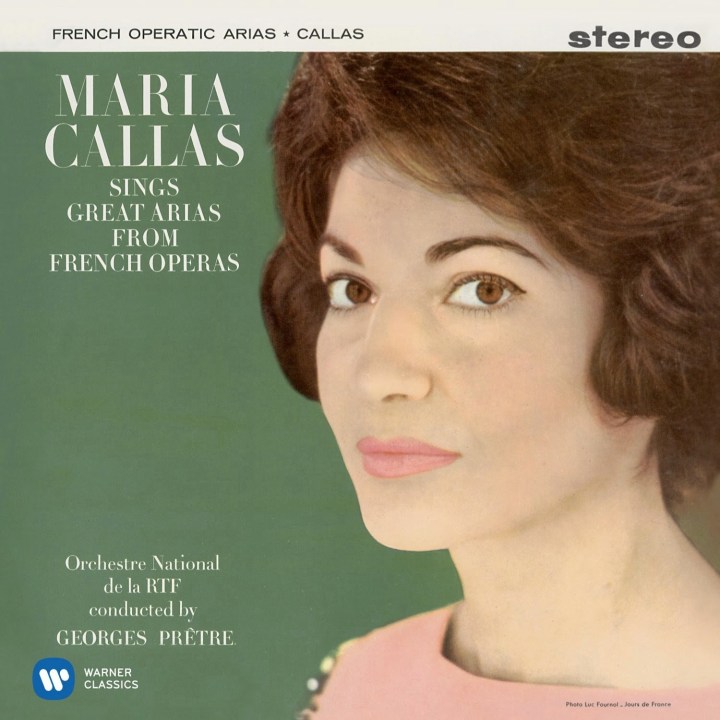Callas never sang a role in French on stage, and only one complete role (Carmen) on record, but as can be heard on these two discs, she had a natural affinity for the language. She spoke it fluently (though tellingly refused the role of Carmen in the Beecham recording, “because my French isn’t good enough yet”) and of course made Paris her home in her last years. Previously she had sung only Ophelia’s Mad Scene in French on the Mad Scenes recital disc and Louise’s Depuis le jour in recital in 1954.
Two years separate the recording of these two discs, and it is alarming to hear the marked deterioration in Callas’s voice in such a short period of time, a voice that was already showing signs of stress in the first recital recorded in 1961. These were also the last records of hers to be produced by Walter Legge.

Recorded May 1963, Salle Wagram, Paris
Producer: Walter Legge, Balance Engineer: Francis Dillnutt
Despite her vocal problems, and despite the fact that she is evidently having to tread carefully, there are, however, still treasures on the second disc. She sounds strained to the limits by the Gluck, and it can make for uncomfortable listening. Even so her grasp of the classic style and her command of legato never falters. There are also signs of strain in Leila’s Comme autrefois, (though her phrasing is exemplary) and Manon’s Je marche sur tous les chemins, shorn of the ensuing gavotte, ends somewhat inconclusively. Manon’s Adieu, notre petite table, though, is a different matter; maybe a tad too serious, but the sadness she gets into this little solo is most touching, and she makes the aria work supremely well out of its context.
For the rest, we are vouchsafed three great performances. Gounod’s Margeurite comes as a total surprise, Callas finding here a lightness of touch that one might have thought was beyond her by this time. In the Ballade she meticulously differentiates between Marguerite’s thoughts and the strophic song she sings, carefully placing Marguerite’s simplicity before us. Her innocent rapture when she opens the casket of jewels is brilliantly caught. There is charm here (a trait which often eluded her in the past) and femininity, the text clearly enunciated, the runs deftly executed. She is defeated only by a watery top B at the end, which detracts from, rather than caps, what had been a beautiful performance.
Berlioz’s Margeurite is superb. Alongside Janet Baker’s performance on the Prëtre recording, this is one of the greatest performances of the piece put down on record. At the beginning of the aria, Callas perfectly mirrors the tone of the cor anglais with her first words, then beautifully lightens her tone, putting a smile in the voice for Sa marche que j’admire (and note how we hear the separation of the duple quavers in de sa main, de sa main la caresse, without once disturbing her impeccable legato). Her mounting rapture at Je suis a ma fenetre, where she uses the rests brilliantly to illustrate the recollection of Margeurite’s breathless excitement at Faust’s arrival, finds its release in a cathartic O caresses de flamme, which she achieves again without once upsetting the long musical line. “Who would not wither in the flame of her genius?” asked the Berlioz scholar, David Cairns. Who indeed? I can only imagine what she might have done with the roles of Cassandre and Didon, and why not Les Nuits d’Ete too? Can you not imagine Callas singing the words O grands desirs inapaisees? If only Callas had sung more Berlioz. It was a natch made in heaven.
And finally I turn to Charlotte’s great Letter Scene, arguably the most dramatic piece on the album, which brings out the best in her. How brilliantly she differentiates between Charlotte’s thoughts and Werther’s own words, particularly noticeable when she repeats the phrase Ne m’accuse moi, pleure moi, as their significance dawns on her. Unerringly, she captures Charlotte’s mounting panic as she reads the letters. So vividly does she bring this scene to life, that I can now just read through the text, and Callas’s voice and inflections come to my mind’s ear. Like many of her performances, it spoils me for all others.

Recorded March & April 1961, Salle Wagram, Paris
Producer: Walter Legge, Balance Engineer: Francis Dillnutt
Though there are still a few wild and insecure notes, the first disc is one of the classic recital discs of all time, and one I would never be without. Whole tomes could be written about Callas’s psychological insights, her realisation of the composer’s intentions; every aria is like a new discovery. There isn’t a single dud on the recital, though the rather empty coloratura of Philine’s Je suis Titania would hardly seem worth her effort. She manages it remarkably well, the filigree beautifully executed, with a lovely lightness of touch, magically lightening her tone. She sounds a different singer from the Carmen and Dalila, which precede it, but it’s still my least favourite piece on the disc.
Everything else is pure Callas Gold. The Gluck arias sung with passion, but retaining their classic contours, Orphee’s J’ai perdu mon Eurydice emerging as a true lament. Note the appeal in the voice at the words C’est ton epoux, ton epoux fidele, the blank, despairing tone at Mortel silence and the suffering that truly tears at the heart (dechire mon coeur). Alceste’s great entreaty to the gods is hardly less affecting. Though the top notes are driven here, they are not intrusive, and Callas again finds a wealth of colour for each intercession, for each recurring statement of Divinites du Styx, with a lovely softening of her tone at Mourir pur ce qu’on aime.
Carmen’s arias are best seen as a preparation for the complete set, but the Habanera is seductive and playful, and the Segeudille full of humour, lightly and playfully sung. Dallila’s arias are even better. When it comes to Printemps qui commence I can do no better than to quote Ronald Crichton in an issue of Covent Garden’s About The House.
Callas, in her matchlessly intelligent and instinctive record, is like an elegant young tigress stretching her limbs in the spring sunshine.
The danger lurking under that seductive surface is unleashed in Amour viens aider ma faiblesse, and then she gives us a real siren, when she sings the famous Mon coeur s’ouvre a ta voix. Incidentally, always a stickler for the composer’s intentions, Callas here sings exactly what Saint-Saens wrote, which is that Ah reponds a ma tendresse should be sung in one breath. Most singers add an extra Reponds, which gives them a chance to snatch an extra one. In the second statement, she does indeed take a (perfectly justifiable) breath at Verse moi, verse moi l’ivresse (there is a comma here after all), but this might have been the reason why she refused to allow the aria to be released when the record first came out. It wasn’t issued until the disc was reissued after her death. In any case I doubt any of these arias has ever been done better, and they are enough for Alan Blyth to name Callas as Dalila in his dream cast for Samson et Dalila in his comparative review in Opera on Record.
Juliette’s Waltz Song is a miracle of lightness and elegance. Though the tone is mature, Callas suggests better than anyone the joy of the young girl, but note too the change of colour, when a veil of sadness comes over her voice at Loin de l’hiver morose. Callas gets more meaning out of this seemingly innocent tune than any other singer I know. Chimene’s glorious Pleurez, mes yeux has a dark, tragic beauty, her chest tones uniquely telling, her legato superbly eloquent.
Finally we come to Louise’s apostrophe to love and life. There are some alarming flaps on high notes here, and we note that even in 1954 the aria never quite worked for her in toto, but the quiet intensity of her intent is never in doubt. Has any other singer, before or since, captured quite so unerringly Louise’s mounting rapture, or sung quite so erotically the words je tremble delicieusement? So her voice doesn’t always do quite what she asks of it. Who cares, when she realises the fundamental truth at the root of this aria, which is actually about a young girl’s sexual awakening? When this recital was first reissued, Richard Osborne wrote, “Records like this change people’s lives.” It certainly changed mine